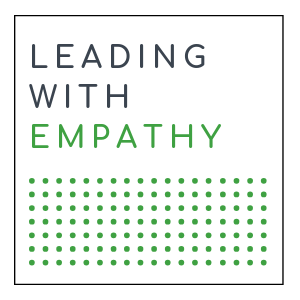After 2 years of Leading from Home, here are my top 3 reminders for managers looking to flex their empathy muscle
When I created my 'Leading with Empathy' course in 2019, the majority of requests for my workshops came from leaders who already indexed high on the empathy scale, likely had at least one Brené Brown book next to their bed and were almost always female. In March 2020, as the world went into lockdown and empathic leadership got it's long-awaited and much-deserved moment in the spotlight ('empathy' as both a search term and a topic reached an all-time high on Google search that year) I saw the desire to dial into empathy spread to every leader, regardless of their business area, gender identification, tenure, confidence level or Brené-awareness.
2 years on, as I look back on more than 400 virtual workshops delivered to leadership teams in the company I work for and others across the globe, and as we start to see real signs of pandemic-life coming to an end, I'm here to remind every leader who finds themselves bookmarking or even actively reading the forest of articles on the subject of compassionate and empathic leadership to focus on the smallest, most human behavioral adjustments that actually make the biggest difference. In a world where leaders themselves bear some of the heaviest burnout burden, it's important to note that none of this is a heavy load. It's a mini-workout that gives you an empathy six-pack without any crunches! Here are 3 for starters - let me know if you want more (I have an almost endless list). And if they feel obvious, that's because they are. I challenge you to ask yourself just how often you truly do these (and whatever your answer, do more).
Listen and List
In my research, the #1 leadership behavior that makes people feel a sense of belonging in the workplace (which in turn leads to better business outcomes, less attrition, improved wellbeing and being a destination for top talent) is when leaders remember something personal their reports have shared with them. This could be as simple as the name of their spouse, the country they grew up in, the fact that they're vegan or which TV show they just binged - the human signals that come up in everyday conversation. Write them down in real-time and then use them in subsequent conversation. Volunteer information about your own life and you'll find people reciprocate. There's no faster way to make your team feel listened to and cared for.
Say Thank You
While I'm always encouraging leaders to build their own Thank-You Departments with systems and processes at their team or org level, never underestimate the power of a personal text, ping, email, call or handwritten note. As a leader you have the power to change the trajectory of someone's day, week or month with a simple and authentic thank you. My research is filled with stories of treasured post-it notes and saved (and replayed) voicemails from leaders who I guarantee didn't know at the time (and perhaps still don't) how much their words meant to the recipient. Build non-negotiable appreciation time into your calendar and use it to review the past week and send some kindness. It takes 30 seconds to send the message. Try it right now and see what happens.
Hand-le your 1:1s
That weekly block of 1:1 meetings with your directs might secretly afford you some time to multi-task (I'm admitting it even if you won't!), but not being fully present is a huge factor in driving feelings of exclusion. Giving your whole attention is hard, especially as an overwhelmed leader who is chain-smoking your meetings (my favorite way of reframing), but given the influence you have over their ability to do great work you owe it to them and yourself to visibly demonstrate that you're listening. My biggest tip? Show your hands - hold a cup or pen, play with an elastic band, do whatever it takes to show you're not multi-tasking (and if you are making notes in a document, tell them you're doing so every single time). You know how crap you feel when your dinner date picks up their phone and replies to a text while you're mid-anecdote? Don't be that person.
